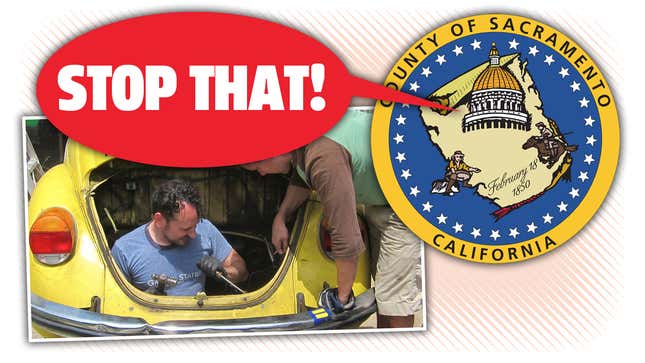
There’s an interesting discussion happening over at the Grassroots Motorsports forum right now, and presumably at many other places off-line. It’s about laws in Sacramento County stating, essentially, that almost any auto repair you do on your property is illegal. Of course, this is deeply troubling to almost everyone reading right now.
Similar laws do exist in other counties and states, of course, but since there’s been some conversation recently around the Sacramento County laws, we may as well start there. The laws in question have to do with Sacramento’s Zoning Code, the website for which has an explanation of the codes related to auto repair.
The code states that conducting “minor vehicle repair” or “minor automotive repair” is legal at a residence, and defines “minor automotive repair” as:
Brake part replacement
Minor tune-ups
Change of oil and filter
Repair of flat tires
Lubrication
Other similar operations
(See section 5.2.0.B of the Zoning Code)
OK, that seems fairly reasonable so far. That is, until you get to this section of the explanatory website:
2. Is Minor Vehicle Repair Permitted at Residences?
Yes. However, it is unlawful for any person to engage in, or permit others to engage in, minor vehicle repair or maintenance in any agricultural, agricultural-residential, residential, interim estate and interim residential zones under any of the following circumstances:
1. Using tools not normally found in a residence;
2. Conducted on vehicles registered to persons, not currently residing on the lot or parcel;
3. Conducted outside a fully enclosed garage and resulting in any vehicle being inoperable for a period in excess of twenty-four hours.
Here we have some issues. How exactly do you define “tools not normally found in a residence?” A socket set? A torque wrench? A brake drum puller? This feels like a rule that’s dangerously open to interpretation with pretty minimal supporting evidence.
Number two is clearly there to prevent people from running off-the-books repair shops, but what if you’re working on a friend’s car? And number three means you can’t do anything unless you have an actual garage, and whatever you’re doing you better get it all wrapped up inside of one day, which, as most of us who’ve dealt with one stubborn, time-sucking, hard-to-reach bolt know, is not always possible.
Of course, “Major Automotive Repair,” that is, anything not explicitly defined under “Minor Automotive Repair,” is not legal anywhere on your own property, even if you’re doing it in the sanctity of your own closed garage.
One commenter on the Grassroots Motorsports forum reported that he’d already been issued a $430 fine for working on his car in his garage:
nimblemotorsports said:
umm, I have not been left alone, they levied a $430 fine yesterday. You can request a hearing to review the code enforcement decision, that costs $700 to complain.
These rules aren’t from some fussy HOA, it’s an entire county. As to why the county is so against home automotive repair and work, they state this reason:
5. Why is Code Enforcement Concerned About Residential Automotive Repair?
The chemicals involved in major automobile repair can pollute our neighborhoods and endanger the health and wellbeing of our residents. Furthermore, this kind of activity increases vehicle traffic and the visual impact can negatively impact property values.
It seems like codes governing the safe handling of chemicals and materials can be enforced without making all auto repair illegal, and it’s hardly like every repair involves harmful chemicals. In fact, the most common harmful chemical is likely used motor oil, and that’s one of the permitted residential repairs.
Besides, lawn and garden care have plenty of very harmful chemicals associated with them—weed killers, pesticides, poisons for all manner of animals and insects—and nobody’s trying to outlaw home gardening.
I’m not even sure it’s fair to say home repair increases vehicle traffic any more than, say, a neighborhood barbecue would.
Sure, if your lawn is full of junked cars and you’re running an illegal lube shop out of your backyard, those are real issues. But residents with project cars they work on? There’s no good reason that should be illegal.
For people with vintage or unusual cars, there often is no other option than to be able to do at least some of your own repairs, and laws that make that illegal are effectively making vast amounts of the entire car-owning-as-an-interest or hobby illegal, and who the hell wants that?
Terrible people, that’s who. Sad, tedious people who won’t rest until the world is slathered in boring grayscale crossovers. That’s not a world I want to live in, and that’s why these laws need scrutiny and pushback. Knowing about them is the first step.